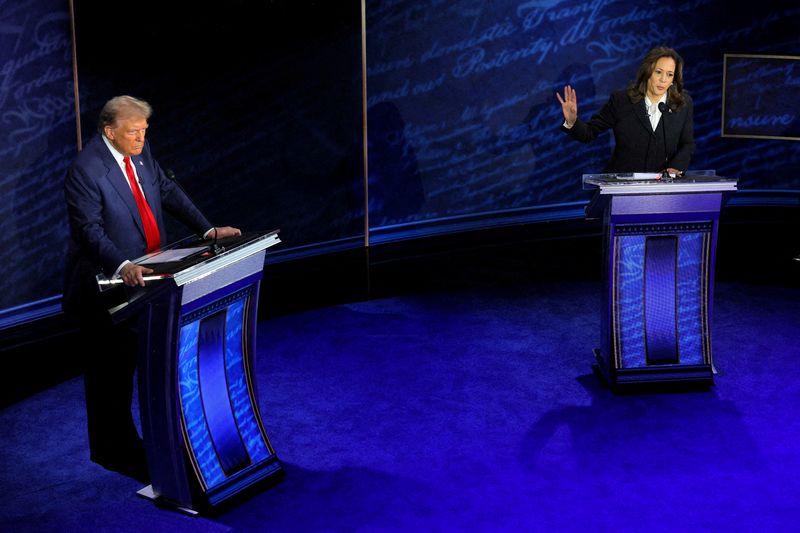ERIE, Pennsylvania (Reuters) - The command center for Donald Trump's campaign in one of the most hotly contested counties in America's most important election battleground sits in a small room of a strip-mall office.
The room in an office rented by Erie County's Republican Party comes to life a couple times a week when the two-person staff hosts the volunteer network the campaign calls Trump Force 47.
A few miles away in a bustling office in downtown Erie, paid staff and volunteers on Vice President Kamala Harris' campaign make phone calls, press new campaign buttons and organize watch parties and phone banking. A chalkboard keeps score of door-knocking: 12,000 households so far toward a goal of 20,000, or nearly one of five in the county.
With just four weeks before the Nov. 5 presidential election, the battle for Erie County - a historically must-win county in a must-win state - demonstrates the urgency of identifying and contacting individual voters in a campaign that remains stubbornly close, according to campaign staff and volunteers for both campaigns.
While the Harris campaign is using its sizable cash advantage and newfound enthusiasm to build a towering ground-game operation aimed at mobilizing supporters and identifying new voters, the Trump campaign is focused on infrequent voters and betting on a voter registration drive that has cut into the traditional Democratic advantage.
Harris and the Democratic Party raised $361 million in August compared to Trump and the Republicans' $130 million, and she spent nearly three times as much as her opponent that month, federal financial disclosures show.
Reuters interviewed some 40 supporters, campaign staff, volunteers and voters who said that Harris' ground game advantage could test whether brick and mortar campaigns still prove useful in campaigns that are defined by viral moments, influencers and social media ad wars.
"Trump and his team appear to be banking on the power of his personal pull," said Chris Borick, a pollster and political science professor at Pennsylvania's Muhlenberg College.
"Harris and the Democrats are investing deeply in a more traditional ground game here and thus this election will be a test of dramatically different strategies."
The volunteers and voters also described rising tensions as the campaigns dump millions of dollars on divisive digital and television ads, robo calls, text messages and door-knocking.
"I've been pretty bombarded with mail, phone calls and texts," said Erin Miller, 38, a bartender and mother of six who recently moved to the state from Colorado and has yet to vote locally in a presidential election, making her a prime target for the campaigns.
With 19 electoral votes Pennsylvania is the biggest prize among the battleground states that will decide the election.
Erie County, a blue-collar region with 177,000 registered voters, has voted with the winning presidential candidate for the last four elections.
Biden won Erie County in 2020 by less than 1,500 votes, or 1.03 percentage points, an even closer margin than his 1.2 percentage point win in Pennsylvania overall. In 2016, Trump won Erie County over Hillary Clinton by fewer than 2,000 votes.
The Harris campaign and the Democratic Party have three offices in Erie County and eight paid staff along with more than 300 volunteers.
"It's the bellwether part of it. It's the mere fact that this particular city, in this particular state, could ultimately decide who's president and they know it," said Marie Troyer, 60, a retired teacher who got a job on the campaign answering phones and managing volunteers.
BOOTS ON THE GROUND
Despite the ground game advantage, the Harris campaign has found it hard work to mobilize Black voters who make up about 16% of the city's population, especially Black men, according to Reuters interviews.
Howard Pratchett, 48, a barber, said he plans to vote for Trump because he is more "factual" than Harris. "We don't care about LBGT rights. We don't care about, you know, abortion rights. We're not worried about that. They don't offer anything to the straight Black male voters," Pratchett said.
Monty Davis, 51, who runs a local youth program, said he appreciates President Joe Biden's efforts to lower costs and plans to vote for Harris. But he warned the energy among the Black community is not as high as it was with Presidents Barack Obama or Biden.
"It's just not that intense," Davis said.
The Trump campaign's two paid staffers in Erie also oversee two other counties, according to Erie County Republican Chairman Tom Eddy.
The Trump campaign and local Republicans declined to say how many volunteers they have in the county, but local officials conceded they have fewer than the Democrats.
As in other battleground states, the Trump camp is relying on deep-pocketed outside groups – like billionaire Elon Musk’s America PAC - and a much looser network of supporters and volunteers to mobilize voters.
Since 2015, when Trump emerged as a leader in Republican politics, Republicans and outside groups have significantly narrowed the Democratic advantage in voting registrations in Erie and in Pennsylvania overall.
In 2015, Democrats enjoyed a roughly 33,000 voter registration advantage in Erie County, but that has been whittled down to 10,000, according to current county election records.
Statewide, Democrats have a roughly 338,400 voter registration advantage over Republicans, down from the commanding 892,624 advantage Democrats held in 2016, state voter data shows.
Sam Talerico, the county's Democratic chairman, conceded the Republican surge in registrations is unwelcome news.
"We certainly don't like to see those registration numbers converge, but that's the bad news. The good news is, you know, I still think we have an advantage with independents turning our way, and that's making a difference," he said.
Republicans also are banking on Trump's frequent visits - five rallies over three campaigns in Erie, including two visits this election. The rallies represent mobilizing opportunities as organizers register voters and collect cell phone numbers and email information.
Harris will make her first visit to Erie on Oct. 14. Her running mate Tim Walz visited in September.
And then there's Trump Force 47, the volunteer network that knocks on the doors of infrequent voters to determine whether they plan to vote, and for whom. Volunteers win awards, such as hats and sweaters, for knocking on more doors.
"We are not trying to persuade anyone. It's more just that the campaign is trying to make sure that people who are already inclined to vote for Trump get out and vote," said volunteer Justin Berkheimer, 39, who works at a group home for people with mental disabilities.
A HEATED CAMPAIGN
For both campaigns the intensity of the fight for Erie has spilled over into threats, antagonism and uncomfortable conversations, volunteers said.
A half-dozen die-hard Trump fans told Reuters they are uncomfortable being seen as public supporters of the former president.
That's a departure from 2016 when Erie was flooded with Trump signs, according to local officials and volunteers.
Patrick Fuller, 50, a credit union employee who said he has knocked on more than 2,000 doors for Trump this election, said he leaves his red MAGA hat at home to avoid confrontation.
"A lot of people are afraid to get involved, because they are afraid that somebody will swear at them or threaten them," Fuller said.
Other volunteers said they had their cars spit on for displaying Trump bumper stickers.
County Democrats said they ran into tensions when they pushed into rural areas, opening up a satellite office in a part of the county that Trump won with 72% of the vote in 2020.
Volunteer Kelly Chelton, 62, described a man lunging at a volunteer because he was angry about the large wooden sign reading: "Christians Against Trump."
"He came in looking for a fight," Chelton said. "He asked how do you know that Trump isn't Christian." She added: "He was just screaming and yelling."

The county party later installed video security cameras, Chelton said.
(This story has been refiled to rephrase paragraphs 1 and 2)
